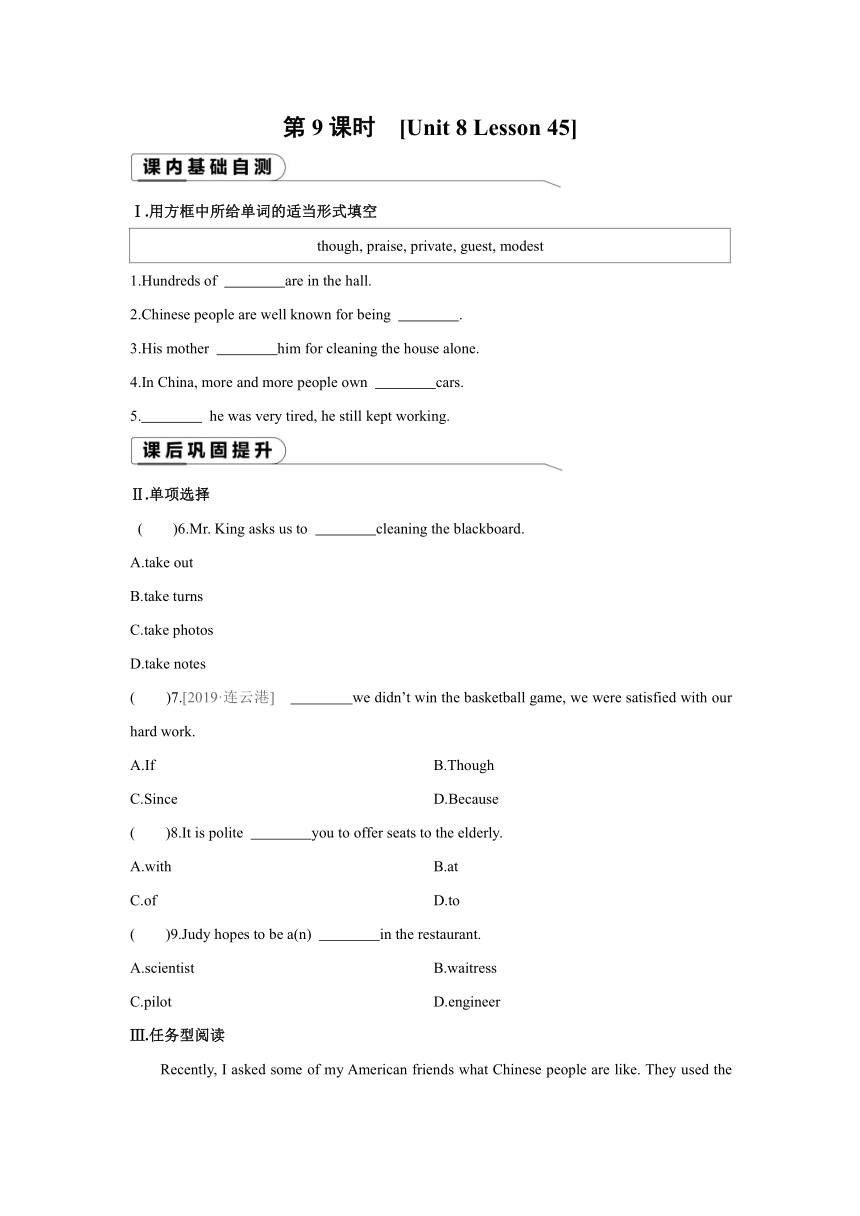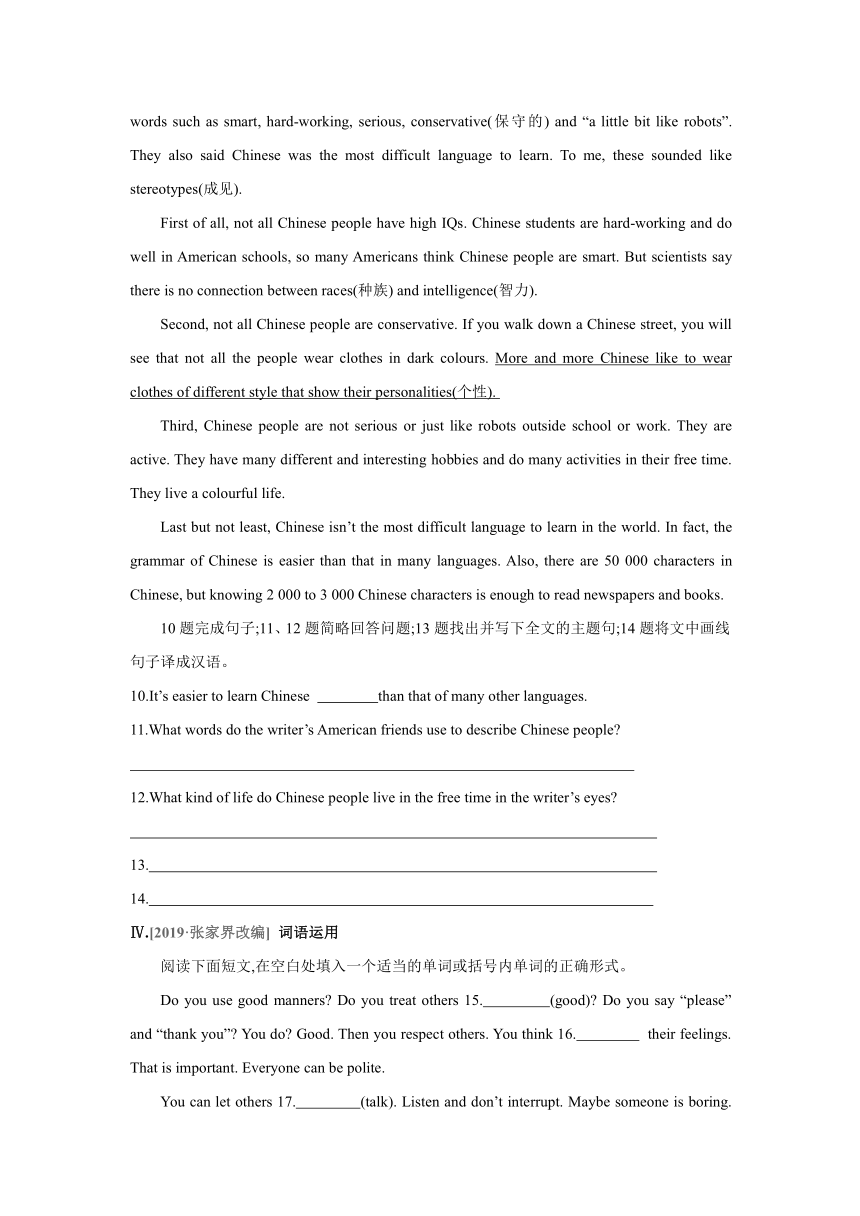冀教版英语九年级下册课课练:Unit 8 Lesson 45 Different Manners课课练(word版,含答案)
文档属性
| 名称 | 冀教版英语九年级下册课课练:Unit 8 Lesson 45 Different Manners课课练(word版,含答案) |

|
|
| 格式 | docx | ||
| 文件大小 | 54.6KB | ||
| 资源类型 | 教案 | ||
| 版本资源 | 冀教版 | ||
| 科目 | 英语 | ||
| 更新时间 | 2022-07-20 16:36:45 | ||
图片预览


文档简介
第9课时 [Unit 8 Lesson 45]
Ⅰ.用方框中所给单词的适当形式填空
though, praise, private, guest, modest
1.Hundreds of are in the hall.
2.Chinese people are well known for being .
3.His mother him for cleaning the house alone.
4.In China, more and more people own cars.
5. he was very tired, he still kept working.
Ⅱ.单项选择
( )6.Mr. King asks us to cleaning the blackboard.
A.take out
B.take turns
C.take photos
D.take notes
( )7.[2019·连云港] we didn’t win the basketball game, we were satisfied with our hard work.
A.If B.Though
C.Since D.Because
( )8.It is polite you to offer seats to the elderly.
A.with B.at
C.of D.to
( )9.Judy hopes to be a(n) in the restaurant.
A.scientist B.waitress
C.pilot D.engineer
Ⅲ.任务型阅读
Recently, I asked some of my American friends what Chinese people are like. They used the words such as smart, hard-working, serious, conservative(保守的) and “a little bit like robots”. They also said Chinese was the most difficult language to learn. To me, these sounded like stereotypes(成见).
First of all, not all Chinese people have high IQs. Chinese students are hard-working and do well in American schools, so many Americans think Chinese people are smart. But scientists say there is no connection between races(种族) and intelligence(智力).
Second, not all Chinese people are conservative. If you walk down a Chinese street, you will see that not all the people wear clothes in dark colours. More and more Chinese like to wear clothes of different style that show their personalities(个性).
Third, Chinese people are not serious or just like robots outside school or work. They are active. They have many different and interesting hobbies and do many activities in their free time. They live a colourful life.
Last but not least, Chinese isn’t the most difficult language to learn in the world. In fact, the grammar of Chinese is easier than that in many languages. Also, there are 50 000 characters in Chinese, but knowing 2 000 to 3 000 Chinese characters is enough to read newspapers and books.
10题完成句子;11、12题简略回答问题;13题找出并写下全文的主题句;14题将文中画线句子译成汉语。
10.It’s easier to learn Chinese than that of many other languages.
11.What words do the writer’s American friends use to describe Chinese people
12.What kind of life do Chinese people live in the free time in the writer’s eyes
13.
14.
Ⅳ.[2019·张家界改编] 词语运用
阅读下面短文,在空白处填入一个适当的单词或括号内单词的正确形式。
Do you use good manners Do you treat others 15. (good) Do you say “please” and “thank you” You do Good. Then you respect others. You think 16. their feelings. That is important. Everyone can be polite.
You can let others 17. (talk). Listen and don’t interrupt. Maybe someone is boring. You can still listen 18. (polite).
19. (use) good manners makes people happy. It shows you respect them. Using bad manners can make 20. (they) mad. 21. when something bad happens to you, you can still be polite. You don’t have to get mad. Shouting loudly or using bad language doesn’t help 22. (something).
Saying “excuse me” is also good manners. When you bump(撞) into someone by accident, you should say, “Excuse me.” When you need to walk in front 23. someone, say, “Excuse me.” Then people will 24. (respect) you, too.
答案
课内基础自测
Ⅰ.1.guests 2.modest 3.praised 4.private 5.Though
课后巩固提升
Ⅱ.6.B 7.B
8.C 固定句型。“It is+adj.+for/of sb. to do sth.”意为“对某人来说,做某事是……的”。当句型中的形容词指人的品质时,用介词of;指事物特征时,用介词for。polite指人的品质,故用of。
9.B
Ⅲ.10.grammar
11.Smart, hard-working, serious, conservative and “a little bit like robots”.
12.They live a colourful life.
13.To me, these sounded like stereotypes.
14.越来越多的中国人喜欢穿不同款式的服装来展示他们的个性。
Ⅳ.15.well 16.about 17.talk 18.politely 19.Using 20.them
21.But 22.anything 23.of 24.respect
Ⅰ.用方框中所给单词的适当形式填空
though, praise, private, guest, modest
1.Hundreds of are in the hall.
2.Chinese people are well known for being .
3.His mother him for cleaning the house alone.
4.In China, more and more people own cars.
5. he was very tired, he still kept working.
Ⅱ.单项选择
( )6.Mr. King asks us to cleaning the blackboard.
A.take out
B.take turns
C.take photos
D.take notes
( )7.[2019·连云港] we didn’t win the basketball game, we were satisfied with our hard work.
A.If B.Though
C.Since D.Because
( )8.It is polite you to offer seats to the elderly.
A.with B.at
C.of D.to
( )9.Judy hopes to be a(n) in the restaurant.
A.scientist B.waitress
C.pilot D.engineer
Ⅲ.任务型阅读
Recently, I asked some of my American friends what Chinese people are like. They used the words such as smart, hard-working, serious, conservative(保守的) and “a little bit like robots”. They also said Chinese was the most difficult language to learn. To me, these sounded like stereotypes(成见).
First of all, not all Chinese people have high IQs. Chinese students are hard-working and do well in American schools, so many Americans think Chinese people are smart. But scientists say there is no connection between races(种族) and intelligence(智力).
Second, not all Chinese people are conservative. If you walk down a Chinese street, you will see that not all the people wear clothes in dark colours. More and more Chinese like to wear clothes of different style that show their personalities(个性).
Third, Chinese people are not serious or just like robots outside school or work. They are active. They have many different and interesting hobbies and do many activities in their free time. They live a colourful life.
Last but not least, Chinese isn’t the most difficult language to learn in the world. In fact, the grammar of Chinese is easier than that in many languages. Also, there are 50 000 characters in Chinese, but knowing 2 000 to 3 000 Chinese characters is enough to read newspapers and books.
10题完成句子;11、12题简略回答问题;13题找出并写下全文的主题句;14题将文中画线句子译成汉语。
10.It’s easier to learn Chinese than that of many other languages.
11.What words do the writer’s American friends use to describe Chinese people
12.What kind of life do Chinese people live in the free time in the writer’s eyes
13.
14.
Ⅳ.[2019·张家界改编] 词语运用
阅读下面短文,在空白处填入一个适当的单词或括号内单词的正确形式。
Do you use good manners Do you treat others 15. (good) Do you say “please” and “thank you” You do Good. Then you respect others. You think 16. their feelings. That is important. Everyone can be polite.
You can let others 17. (talk). Listen and don’t interrupt. Maybe someone is boring. You can still listen 18. (polite).
19. (use) good manners makes people happy. It shows you respect them. Using bad manners can make 20. (they) mad. 21. when something bad happens to you, you can still be polite. You don’t have to get mad. Shouting loudly or using bad language doesn’t help 22. (something).
Saying “excuse me” is also good manners. When you bump(撞) into someone by accident, you should say, “Excuse me.” When you need to walk in front 23. someone, say, “Excuse me.” Then people will 24. (respect) you, too.
答案
课内基础自测
Ⅰ.1.guests 2.modest 3.praised 4.private 5.Though
课后巩固提升
Ⅱ.6.B 7.B
8.C 固定句型。“It is+adj.+for/of sb. to do sth.”意为“对某人来说,做某事是……的”。当句型中的形容词指人的品质时,用介词of;指事物特征时,用介词for。polite指人的品质,故用of。
9.B
Ⅲ.10.grammar
11.Smart, hard-working, serious, conservative and “a little bit like robots”.
12.They live a colourful life.
13.To me, these sounded like stereotypes.
14.越来越多的中国人喜欢穿不同款式的服装来展示他们的个性。
Ⅳ.15.well 16.about 17.talk 18.politely 19.Using 20.them
21.But 22.anything 23.of 24.respect
同课章节目录
- Unit 7 Work for Peace
- Lesson 37 Don't Fight!
- Lesson 38 Making School a Better Place
- Lesson 39 The Dove and the Olive Branch
- Lesson 40 The UN—Power of Words
- Lesson 41 Jenny's Good Advice
- Lesson 42 Peace at Last
- Unit Review
- Unit 8 Culture Shapes Us
- Lesson 43 A Visit to Chinatown
- Lesson 44 Popular Sayings
- Lesson 45 Different Manners
- Lesson 46 Home to Many Cultures
- Lesson 47 Good Manners
- Lesson 48 Supper with the Bradshaws
- Unit Review
- Unit 9 Communication
- Lesson 49 Get Along with Others
- Lesson 50 Tips for Good Communication
- Lesson 51 What Could Be Wrong?
- Lesson 52 The Power of a Smile
- Lesson 53 Working in Groups
- Lesson 54 How Embarrassing!
- Unit Review
- Unit 10 Get Ready for the Future
- Lesson 55 Look into the Future
- Lesson 56 Manage Your Time
- Lesson 57 Best Wishes
- Lesson 58 Ms.Liu's Speech
- Lesson 59 Keep Your Choices Open
- Lesson 60 Get a Good Education
- Unit Review
